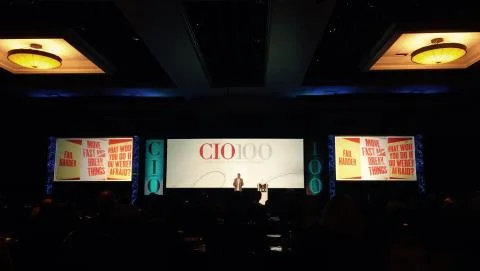One of the initial projects Facebook CIO Tim Campos was tasked with when he joined the company was developing an email and knowledge management strategy. He felt pretty good about his plan, but after presenting it to cofounder and CEO Mark Zuckerberg and others, he quickly realized he was the only one who really liked it.
“Everyone was pretty against my idea except for me,” Campos told attendees of the CIO 100 conference in Colorado Springs, CO, on Tuesday.
A couple of days after presenting the idea, Campos said he received an email from Zuckerberg with the subject line “Will you resign?” Campos, who had only been at the company for about two months at that point, said it took him a couple of hours to work up the courage to open the email. When he did, he quickly realized it wasn’t addressed to him personally.
It was an email to the entire company.
The email came after an employee leaked destructive information, Campos said. In the email, Zuckerberg asked for whoever leaked the information to please resign, Campos said, saying that Facebook would figure out who it was eventually. Zuckerberg went on to write that the employee obviously didn’t share the same values of openness and transparency because they shared the confidential information in a way they were asked not to do.
Campos used the email as an example to emphasize three takeaways from his time at Facebook that he hoped other CIOs could take back to their organizations. The email, he said, emphasized the power of culture: “It serves to reinforce the point: We’re not going to solve this problem by locking down all the information, we’re not going to solve this problem by instituting a lot of bureaucracy, we’re going to solve this problem by embedding it into the culture.”
The three takeaways Campos shared from his time at Facebook are:
1) The Power of Culture: “At Facebook, culture is everything and it’s an incredible timesaver,” Campos said. Culture allows Facebook to cut through bureaucracy, he said. Among the ways Facebook emphasizes its culture is through its now well-known posters that say things like: "Fail harder;" "Move fast and break things;" and, "What would you do if you weren’t afraid?"
Facebook also reinforces its culture through storytelling, like the “will you resign” email example he shared with the audience. “It was an incredibly powerful message,” Campos explained. “Everybody at the company read this email and had the exact same takeaway and perspective that I did, they all thought it was immediately addressed to them. And it was striking as a result of that. And they never forgot it. And we keep talking about it - we talk about how do we handle confidential information in the company. The ‘will you resign’ email is quite famous.” There are a ton of stories like this that Facebook uses to reinforce key culture points that prevent the creation of unnecessary steering committees and advisory boards, Campos said.
2) The Power of Innovation: Campos cited two key ingredients to innovation that he believes leaders can reinforce - the power to fail and whitespace.
On failure, Campos said: “When failure is not an option, you basically encourage the workforce to do the tried and true. And the tried and true by definition is not innovative.” But when you encourage employees to fail, when you tell them that it’s good and that they can learn from it, then you create an entirely different environment, he said. He emphasized that failure is too big if it puts the company at risk (with startups being an exception, he said). The key is to fail quickly and deliberately, and experiment in ways that are proportional to what you’re trying to accomplish.
On whitespace, Campos used Facebook’s famous hackathons as an example. Employees are basically given three days off to go build what they want, with no expectations on output and no required product focus that they must follow. “You never know how these things are going to evolve. And by giving people the ability to fail and giving them the time to fail then you have created the necessary ingredients for innovation,” he said.
3) The Power of Data: “We use data to make decisions on everything. If there’s a product modification that we need to make, if there’s a product launch that we do, you can bet that there is a ton of data behind it that reinforces that this is a good idea,” Campos said.
Just how powerful can data be? Campos used an example he thought CIOs would find particularly relevant, sharing a problem his IT organization helped solve with a data-driven decision. The problem: The sales organization was complaining about how long it took to fill out expense reports. The finance and IT organizations had two competing views on the problem. Finance thought sales was just complaining. IT thought it either needed to build a new solution or get sales to use the mobile version of the existing solution.
Who was right? Neither of them. The data told a different story.
The data found that there was actually a fair amount of mobile adoption of the expense tool. The reason why it was taking sales a long time to submit expense reports was because of a policy issue, Campos said. The policy was simply modified: “With almost no lines of code, we saved every sales person over an hour of time a week. And when we announced this at our sales conference at the beginning of the year, my organization got a giant standing ovation because of this one little policy change. Imagine if we hadn’t used data to make this decision.”
The message on the slide Campos showed as he told this story hit the point home: “Data wins arguments.” He emphasized these takeaways because he said over the next 10 years, CIOS will have a huge opportunity to create economic value on data that their organizations have been sitting on for decades. But to do so requires a change in mindset and a change in leadership.
The power of data-driven business models
“Data is a powerful model for technology organizations to create economic value,” Campos said. If you get it right, data can be a unique source of differentiation because you can’t easily replicate data.
So what are the ingredients of a successful data-based business model? Campos emphasized sourcing, processing capability, utility, and scarcity. In particular, he said to look for unique sourcing for your data.
The opportunities data open up include, cost optimization, user experience, and revenue models. The issues CIOs can expect to run into as they dig into their data are: Information security; privacy expectations and regulation; leadership and culture; pace of innovation.
Campos emphasized the importance of privacy: “There are implicit and explicit privacy expectations that users have, and they have to be honored and respected.”
He left the audience with this question: “What are your information assets?”




